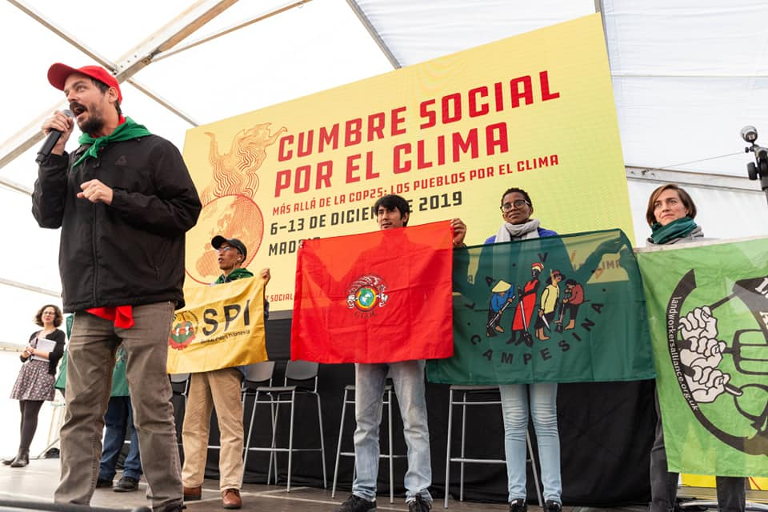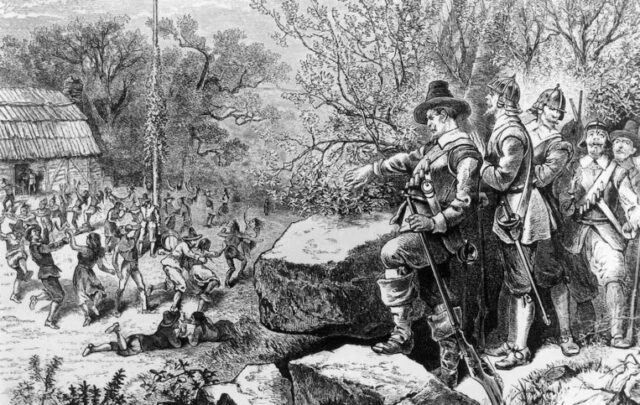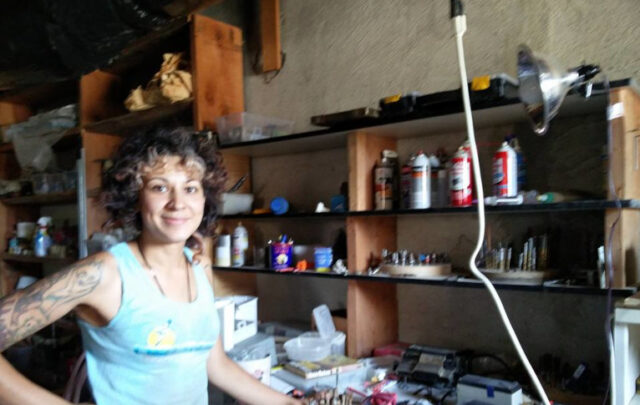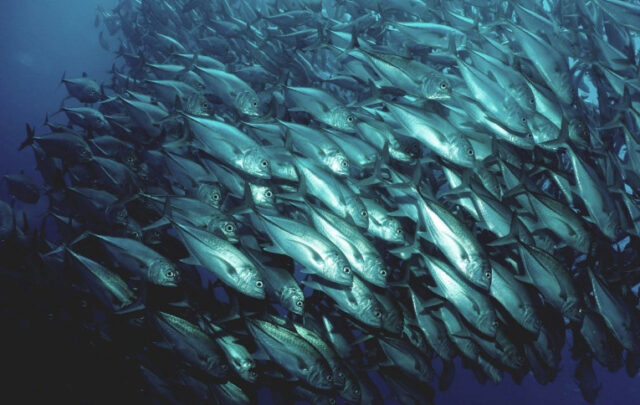This year the UN Climate Change Conference, COP26, will be taking place in Glasgow. Over the coming months, we’ll be posting a series of blog posts to give you some background on the conference, inform you about the work we’re doing, and give you more information about how you can get involved.
For this blog post, our Scottish Policy Coordinator, Roz Corbett, reflects on her experiences at COP25 in Madrid last year.
It’s hard to sum up COP25 easily. In my mind it looks a little bit like those experiments with magnets and iron filings. Thousands of tiny particles of people drawn towards an event that is both multidimensional and very polarised along N-S lines. It was supposed to be in Chile, in the global south, but for the fourth year out of five the COP was held in Madrid in Europe, and so, unlike a standard N-S magnet, the ‘north’ again had more weight.
I went on behalf of the Landworkers’ Alliance, the UK branch of La Via Campesina, a union of small-scale and peasant farmers which represents over 200 million farmers in 81 different countries worldwide. In our group were representatives from SPI in Indonesia, ATC in Nicaragua, Organizacion Boricua in Puerto Rico, NFU in Canada, ZIMSOFF in Zimbabwe, COAG in Spain, CNA in Portugal and a wonderful team of translators and media people. We invested time to work together as a group to learn from each other, understand our struggles and hear each others’ stories and strategies to support agroecology and food sovereignty. And, we worked hard to make the voices of La Via heard at many different levels and in many different spaces.
The conference centre where the official COP was held was vast, hot and strange. At any one time over the course of a fortnight, there were multiple different sessions being run by a range of different actors, often with extremely different world views. While in one room we were part of a group discussion with Friends of the Earth, HOME, and the Climate Justice Alliance on the Right to Climate Justice for peasant farmers and indigenous peoples, in the room next door the World Farmers Organisation (WFO) and Climakers declared that ‘NGOs are causing tension by trying to convince farmers that it is modernisation’ [use of fertilisers, improved seeds, mechanisation and commercialisation] that has lead to agriculture’s contribution to the climate crisis. “We never really wanted to get involved in discussions about exactly what is causing climate change… our primary interest is with our farmers to ensure certainty and profitability” says Theo de Jager, President of the WFO and representative of the Farmers group in the official debating chamber.
The “Green Zone”, the conference area allocated to the general public was a busy, bright and slightly overwhelming space. We worked hard to make our voices heard amid the noise, running a session on food sovereignty, and giving interviews. Display stands invited you to try VR headsets to explore future possibilities, and sit on high-spec electric motorbikes. Corporate sponsorship was everywhere, Impossible Burgers the main dish on the menu, and several different PA systems operating simultaneously made it challenging to talk or hear. Mostly open plan, the allocated Indigenous Peoples’ space was one of the only areas with a dividing wall – to hide behind or keep hidden?
The Cumbre Social – the peoples’ summit – was a completely different and much more energetic space to be in. We worked with It Takes Roots (ITC), ETC group, GRAIN, Ecologists in Action, Friends of the Earth International, collectives of Pastoralists, and many more to share our stories, learn from each other and build resistance. We heard in more detail about the Agroecology Schools being set up across Central and Latin America to strengthen peasants networks. We heard about how peasant farmers are resisting disaster capitalism in Puerto Rico by setting up brigades to support the rebuilding of farms across the country following Hurricane Maria, earthquakes throughout January of this year, and an onslaught of neo-liberalist reforms and privatisation. We heard about the devastating impacts of large scale carbon sequestration projects on peasants and indigenous peoples in Indonesia. We heard from people in Chile about the continuing struggles and the Cumbre Social that still went ahead alongside the one in Madrid. La lucha y la esperanza have become ingrained in my (very limited) Spanish vocabulary from the few days I spent there.
I was both sad and relieved to leave Madrid before the conference ended. I went back to the conference space on the Monday before returning home, and I could feel the growing tension. Protestors had already staged a mass walk out of one session in which Shell, BP, and Chevron argued for a global carbon market, a mechanism which has broadly been discredited as a failure to actively reduce carbon emissions at source, and instead function as a mechanism for private companies to turn a profit. On Wednesday Greta Thunberg, in a press conference at the summit, declared that “the real danger is when politicians and CEOs are making it look like real action is happening when in fact almost nothing is being done apart from clever accounting and creative PR”. A few hours later over 500 people stormed the conference centre protesting at the inaction and CO2 colonialism dominating the COP, followed by another mass sit in on Friday. The official conference finally closed on Sunday, two days later than expected, with no agreement on regulations for carbon markets, or on who should pay for measures to mitigate and adapt to the climate crisis.
Transitioning back to the UK was intense, the general election was just 3 days away, and friends looked exhausted from non-stop canvassing. The Climate Crisis has risen up the political agenda, but was eclipsed by Brexit in the general election. News that the US is putting pressure on the UK to remove even any mention of ‘climate change’ in UK/US trade deals was alarming. A few days after the election results came in, the group of friends in Glasgow who had worked together on canvassing got together for a debrief. The spontaneous and autonomous organising of the group had built a strong energy and we agreed to continue to organise together. As a friend said, she had been disappointed by the election results, but on reflection, hope doesn’t always come from the outcome of our work, but from how we work together. And the collective energy of the group had given her hope. I felt that hope too, both then, and in how our delegation from Via Campesina had worked together at COP, again with a lot of spontaneity and also integrity.
A few days later I spoke to a friend who had been to several other COPs to reflect on both COP and the election. We talked about how to move forward, about allies and activism. He asked a very valid question: what is the point of going to COP? Aren’t all COPs bad?
Looking ahead to COP26
Next year, COP26 will be in Glasgow, where I live, so whether or not to go isn’t really a question for me. I have mixed feelings about it coming to Glasgow. It’s problematic in that this will be the fifth year out of six that it’s been held in Europe. It should rotate to different continents, but the magnet has got a bit fixed on the north. It’s also problematic as this gigantic moving beast has been imposed on Glasgow by the UK government at a time of high political tension between Westminster and Holyrood. The Scottish Government are pushing for indy ref 2 in the coming year. However the UK Government have rejected the Scottish Government’s request for a second independence referendum. It’s unclear what kind of impact COP will have on that process, and vice versa.
In many ways, COP is bad in that it’s failing to achieve the measures that are so desperately needed to avert the climate crisis and achieve climate justice. But, COP is an opportunity for us in the UK to push our politicians to take stronger action on climate change. ‘People Make Glasgow’ is the official slogan adopted by Glasgow City Council in 2013 – I don’t think it was meant to refer explicitly to the slave trade that helped to build the city but the council openly acknowledge this history, and COP26 is an opportunity to highlight the impacts of historical and current colonialism. The Highland Clearances are a deep part of the history and culture of Scotland, and while the Scottish Government has pushed through positive land reform legislation over the past two decades, progress is slow and deep seated cultural norms around private property ownership mean struggles for land justice remain. Land ownership has become increasingly concentrated and privatised, and now just 16 people own 10% of Scotland. As a result, access to land is the primary barrier for those wanting to start small-scale agroecological farming. And yet, we’re in desperate need for a transition to agroecological farming, otherwise our agricultural sector will disappear or be completely consumed by industrial agribusinesses. In Scotland, the average age of farmers is nearly 60 and from 2012-17 the total agricultural workforce in Scotland has dropped by 5,000 – that’s 3 farmers a day, every day.
Glasgow has a reputation for being a friendly city, and it is definitely the friendliest city I’ve ever lived in. I hope that this reputation will go a long way in making people from across the world feel welcome and safe. We must make sure that COP26 is relevant and real to the people who’s place this is their home, their work, their community gardens, community centres and their struggles – and use it as an opportunity to build connections. I keep in mind the film Nae Paseran – about the workers’ strike in Clydebank in 1974 which successfully stopped jet engines being sent to the Chilean Air Force during General Pinochet’s military coup – and I hope COP will bring an opportunity to forge greater international solidarity to support small-scale peasant farmers worldwide, and bring strength to the wider climate justice movement.
____
The Landworkers’ Alliance are developing our plans for COP26 and working with a number of different organisations in Scotland, the UK and internationally to develop a strong food sovereignty and agroecology strand during COP26. We link into the COP26 Coalition which is working towards creating a People’s Summit during COP. COP is much more than an annual event, and in the next few months we’re going to be calling on the UK government to strengthen their commitments on reducing carbon emissions following values of food sovereignty and climate justice ahead of the COP in November.
If you’re interested in getting finding out more or getting involved in the LWA COP26 working group please contact roz@landworkersalliance.org.uk
Teaser Photo credit: La Via Campesina





